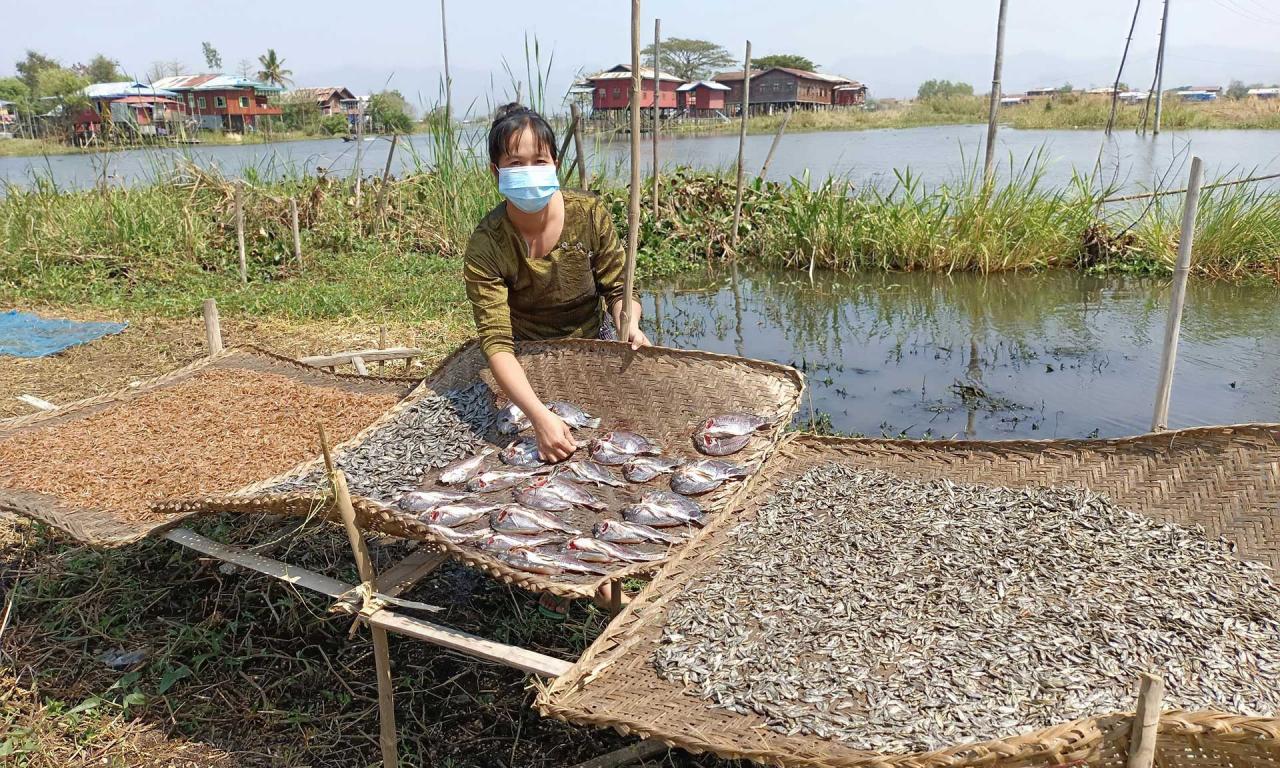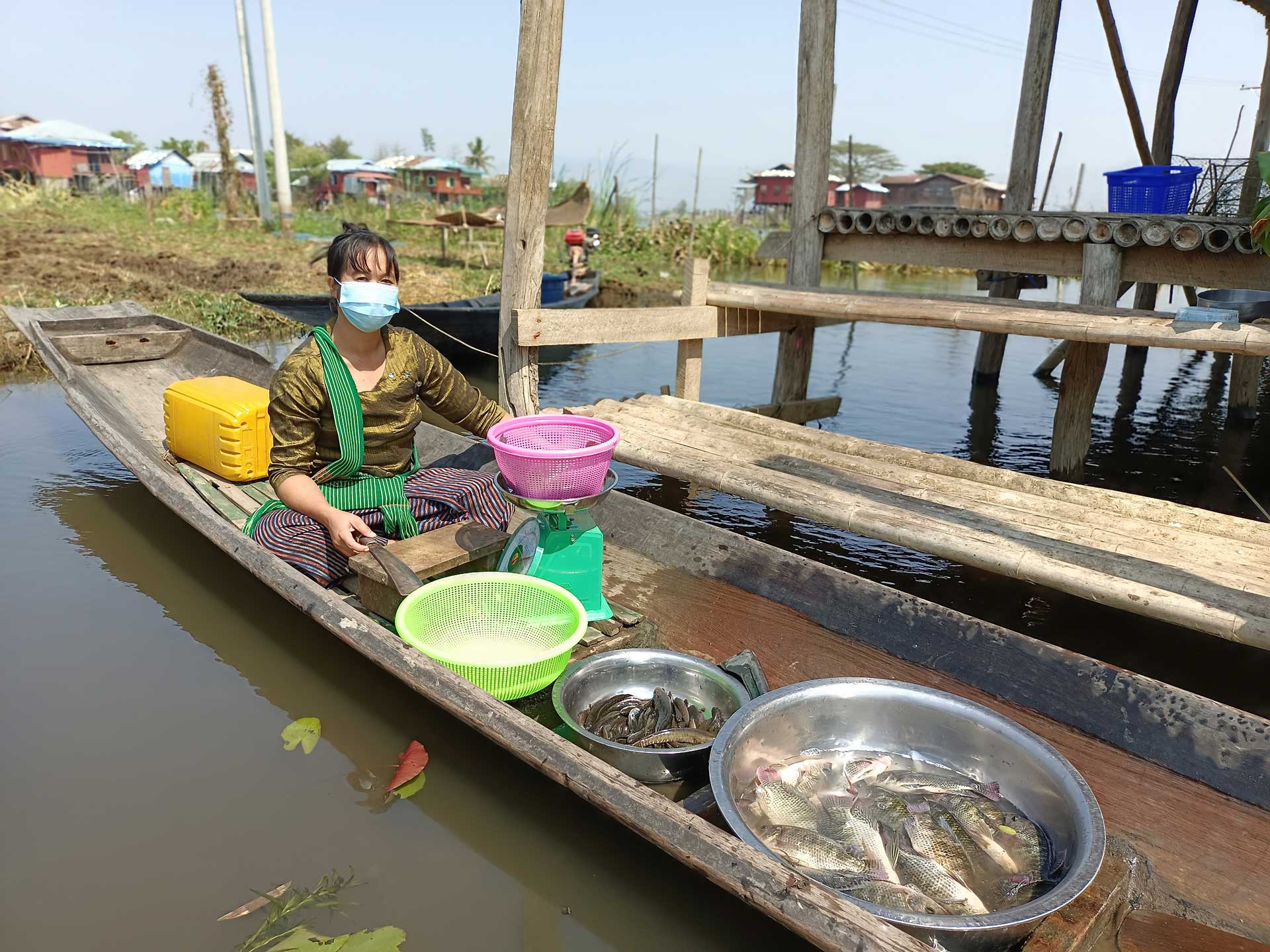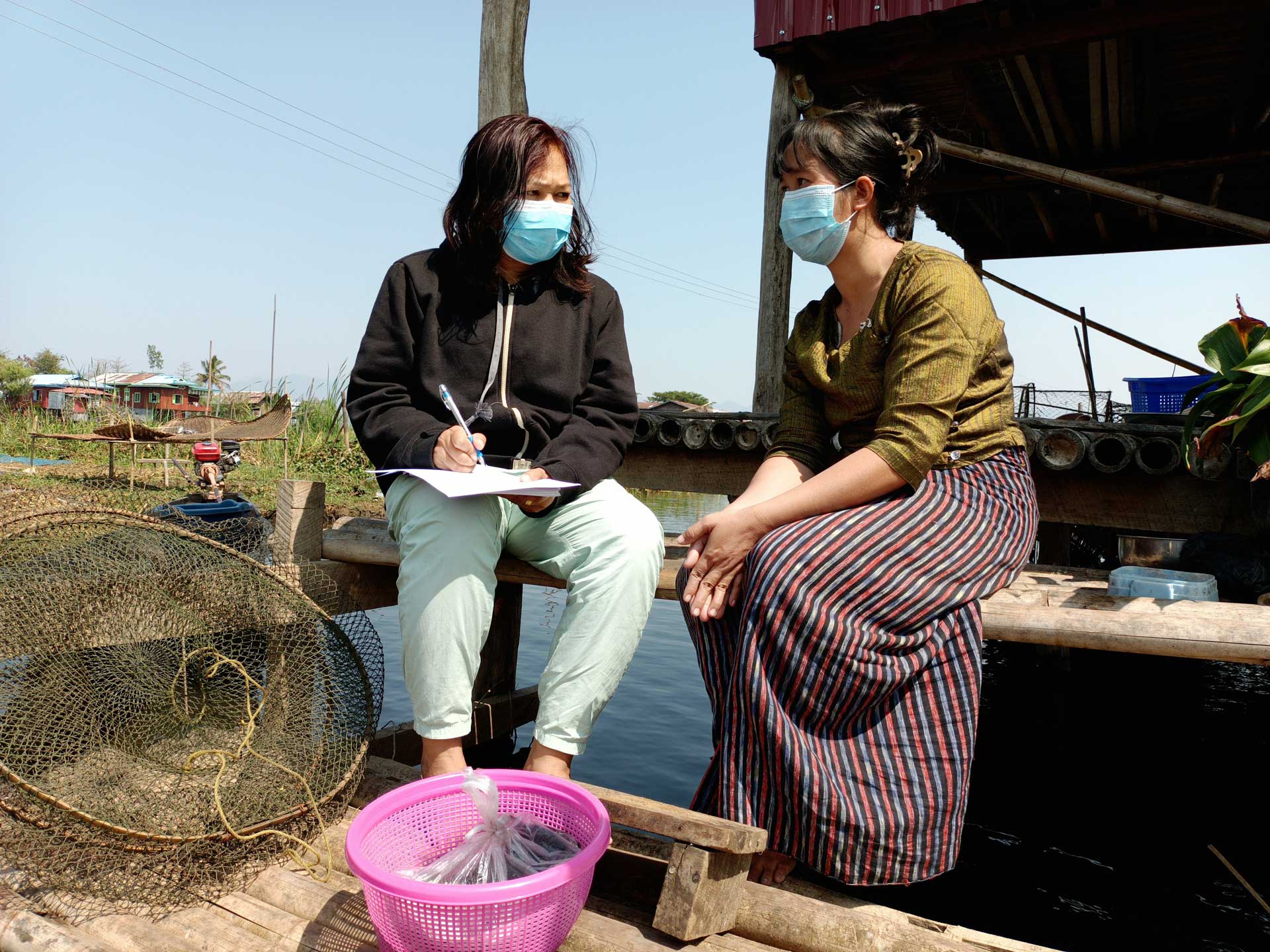
- Burmese fish trader Daw Lae Lae Soe discusses her experiences as a woman fishworker during the COVID-19 pandemic
- Gendered consequences of the pandemic often go unrecognized, but women have been forced to take on additional household responsibilities, like taking care of their children home from school, and therefore have less time to work and earn income
Inspiring stories is a series that focuses on the fishworkers on the ground, highlighting their experiences, challenges and successes in the aquatic food sector. At WorldFish, we aim to highlight the millions of women and men involved in aquatic food systems, especially small-scale artisanal fisheries and aquaculture, and celebrate them for their contributions to food and nutrition security.
Like many women involved in fisheries, Daw Lae Lae Soe faces a world of gender barriers that have only been compounded by the COVID-19 pandemic. A resident of Hae Lone Village in Myanmar’s Shan State, Lae Soe was once the primary breadwinner for her family by purchasing fresh fish, drying it and then selling the preserved fish onwards for profit. While such value-added fish products are a key way for women to earn money along fish supply chains, there is little protection or support for them in times of shocks, and even less recognition of specific gendered consequences of the pandemic. Here, Daw Lae Lae Soe talks about her challenges, hope for the future and her vision for all women fishworkers.
This interview was originally conducted in Burmese and was translated by Aye Nyein Zaw, WorldFish’s communication and training assistant in Myanmar.
How has COVID-19 impacted your daily routine as a fishworker and a mother in Hae Lone Village? How are you coping?
Due to restrictions from the COVID-19 pandemic, I’ve encountered many challenges as a fish trader but also as a mother. Local fish supplies were diminished due to travel restrictions between villages, but lockdown also hit my children’s education, which has been delayed because schools are still closed. With my children home from school, I had more household duties to perform and had less time to earn income through buying fish and trading it. It was also extremely difficult for me to take my children to the hospital or call a doctor for home visits.
Another consequence has been disruptions to my social life and external support. Paying visits to close friends and extended family members in different villages was not possible under restrictions on social gatherings and large groups, but I’m normally dependent on my family for support.
Has this also impacted your ability to continue working in fish trading? What kind of disruptions have you and others been facing?

Lockdown measures made it difficult for me to sell fish to consumers. Before the pandemic, I used to sell fish every day. Once COVID-19 hit, due to travel restrictions between villages and limited supplies of fresh fish, I could only sell fish only once a week. Travel restrictions also posed a lot of difficulties to me in accessing the market to buy general food items.
How has this impacted your ability to produce and sell fish and other aquatic foods to earn an income for your household?
Now, I earn in one week what I was earning daily before the pandemic—my family’s overall income is much lower as a result.
The primary input to my business is fresh fish. While it seems that the pandemic hit the whole fish supply chain, fresh fish production was amongst the hardest hit. Since there is a demand for fish but a lower supply, I cannot purchase adequate amounts of fresh fish for my business. Diminished supplies of fresh fish available means there is less fish for women like me to purchase, dry and sell. The fish prices are volatile and unpredictable as well.
Because of COVID-19 disruptions, what changes have you made to your daily household and fish farming routine to make things easier?

We have to continuously adapt to the evolving situation. The COVID-19 pandemic has now been affecting us for more than two years, but now the political instability has added to it.
The major impact has been on our earnings and income. It is difficult to keep a regular income after the pandemic, but I must always find ways to earn income to meet my family's daily expenses.
Furthermore, the drying of fish takes time. I have to wait until the fish dries before I can sell it at local outdoor markets. To earn income in a shorter amount of time, I’ve stopped processing the fish to dry. Currently, I only sell fresh fish and have also started selling fresh prawns to get a quick income to meet my expenses.
What are the biggest difficulties you face as a woman working in this field? How do you think you can best overcome this?
As a woman selling fish, my mobility is limited. I can sell my fish only in nearby places because at times it is not safe for me to sell and transport fish alone in unfamiliar areas.
There is a possibility that someone might confiscate money from me while I am coming back home after selling fish in a distant market.
The pandemic further limits me as I cannot sell in nearby villages due to entry restrictions across villages.
I think one of the ways to adapt to a changing landscape is to encourage my customers in nearby villages to place orders in advance through the telephone. If I can do that, it’s going to increase my capacity to earn regularly. I will provide on-call delivery services for regular customers and relatives who will connect to us using mobile phones.
What roles and responsibilities do you think men should have in support of women fish farmers?
I believe that both men and women should work together in cooperation. There are certain areas in my business where help from men will create a real difference. In my business, men could help in preparing fish product packaging and transporting the products to buyers. Men should also assume the responsibility of contacting fishermen and negotiating prices, creating linkages with new or unknown clients and transporting fish to other areas where it is not safe for women to go alone.
What additional help do you need to overcome these challenges as a woman? How can you be better supported?
I think women in Myanmar are capable of managing their businesses independently. Nonetheless, we still need assistance from other segments of society to continue our businesses. Some of the areas where I feel I need help as a woman are: establishing linkages with dealers and consumers; additional safety measures, especially from law enforcement agencies to protect women in markets; and an enabling environment for the establishment of new fish markets.
As a woman, I believe I can provide high-quality service to my clients by developing and selling nutritious dried fish products, thereby obtaining a regular customer base and sustaining the aquaculture sector of Myanmar.
